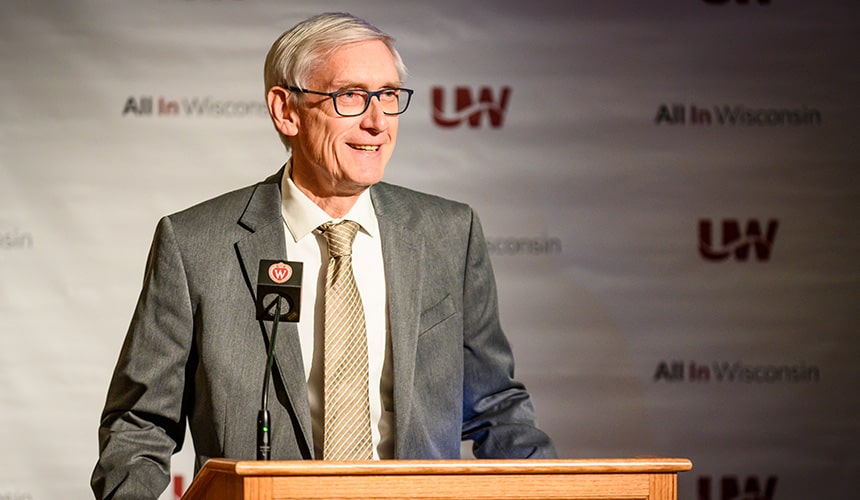
Tony Evers
A Principal’s Principles
Before entering politics, Tony Evers worked through almost every aspect of education. He was a teacher, a principal, a district superintendent, deputy state superintendent, and then state superintendent. But the most useful lessons he learned, he says, came just off of school property.
“I used to hang out on smokers’ corner every day, just to find out what was going on,” he says. “I got a lot of intel. And the kids never misled me.”
Evers enjoyed the conversations, though not the four-pack-a-day habit he picked up and later had to quit cold turkey. It was all part of the price he was willing to pay to foster education in his home state.
A native of Plymouth, Wisconsin, Evers was born into a medical family. His father was a doctor and his mother was a nurse, both working at a tuberculosis sanatorium. Evers initially intended to follow them into a health profession, and he studied zoology at the UW, minoring in chemistry. But though he started medical school — a year of study in Graz, Austria — he quickly found that his education wasn’t complete enough, and his calling lay elsewhere.
“It was an amazing year. It was a year of not great success, but great internal growth for me,” he says. “[My wife and I] came back for several reasons — one was not knowing much German. And if you really don’t know German well, they take it out on you.”
When he returned to Wisconsin, he found he’d been accepted into two UW–Madison graduate programs: pharmacy and education. Education was his top choice. After earning his master’s degree, he became a biology teacher in Baraboo, a media and teacher coordinator in Tomah, and with the guidance of Jim Kavanaugh, he transitioned into becoming a school administrator.
Cigarettes aside, Evers found success in administration but not immediately in politics. He lost his first two races for state superintendent, first to John Benson and then to Elizabeth Burmaster BM1976, MS1984. But the races were relatively cordial, and Burmaster asked Evers to serve as her deputy, a role he held for eight years before finally winning the superintendent’s office, which he held for a decade.
In 2018, Evers decided that he ought to run for governor — he wanted to see improvements in roads, broadband, and other forms of infrastructure, but he also felt that the state wasn’t doing enough to promote and support education.
“I knew we could do better for our kids and for education in general, including higher education,” he says. “It’s the main reason I ran. I knew I could do better; that’s the bottom line.”
After his election, Evers faced friction from a legislature controlled by the opposite party, and then the surprise challenge of dealing with the COVID-19 pandemic. Then, he notes, “the most important thing was getting shots in arms,” but he also recognized that the pandemic caused nonmedical problems. “It was clear that people being isolated from each other causes, for many people, issues around mental health. Just being not part of a group is difficult, and I think the staff members, teachers, everybody involved in this, feels some pain and continues to do so.”
As governor, as when he was a principal, he continues to prioritize learning.
“Education was a top priority, and continued to be even during a pandemic,” he says. “I feel proud that we’ve been able to fund the UW, tech college, and K through 12 at the highest level it has ever been. It’s not adequate, but it’s at the highest level it has ever been.”
 48° F
48° F